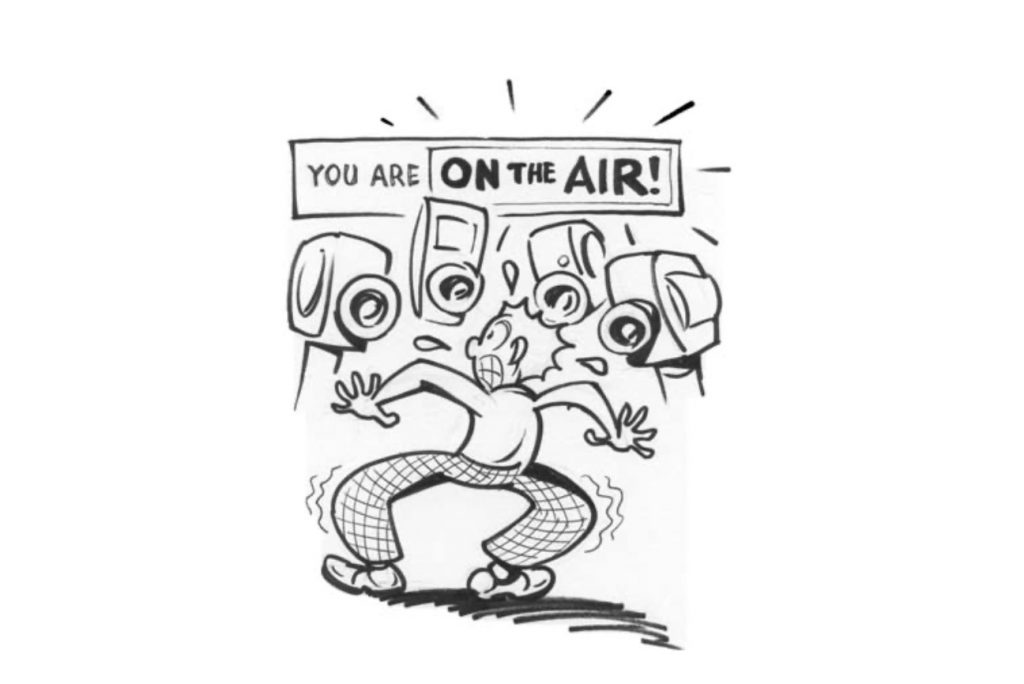Okay, you’ve charmed the media into giving you coverage. And they can’t eat even one more Krispy Kreme. What do you do once that red light illuminates and you’re on the air? Where do you look? What do you say? What if your mind goes blank and you freeze up? Worse yet, what if the reporter making friendly chit-chat with you just seconds before air decides to pull a “Mike Wallace” on you?
First of all, take a deep breath and relax. As we like to say in the newsroom, it’s only television. Believe me, everything that can happen to someone on live TV has happened to me. I’ve frozen up. I’ve stumbled through live reports. One time I even forgot my name. But you know what? Life went on. I didn’t lose my job. They didn’t take my house away. I learned from my mistakes, and I improved. You will too.
The number one fear in America is public speaking. And because television reaches so many more people than could fit into even the largest auditorium, people always ask me how I can seem so comfortable on TV with so many people watching.
But the truth is, when I’m on camera all I see is a lens and a photographer. Most of the time there’s no one else around. And I try not to think too much about how many people are watching at home. Even veteran reporters can scare themselves into looking nervous on camera if they begin obsessing about the number of viewers or what would happen if they suddenly froze up.
Concentrate on talking to the reporter or anchor con-ducting the interview. And if you do freeze up, so what? If what you are talking about isn’t too serious, laugh at yourself and plow ahead.
WHERE DO I LOOK?
This is a common problem. People don’t know whether to look at the camera or the interviewer. I’ll make it simple. Always look at the interviewer. Believe me, it will be much easier for you to keep your composure if you’re not worrying about whether you are looking at the right camera. Just pretend you’re having a conversation with the interviewer while the audience at home is only eavesdropping.
PROPPING YOU UP
Bringing props to the interview is a very good idea. The media loves visuals. Props will make your television appearance more interesting and may also help you relax. You’ll be illustrating your points rather than trying to make an impact with your mere words.
Talking heads are rarely good TV, and if your ultimate goal is to be so good you get invited back for future interviews, always strive to make your appearance as memorable as possible. Interesting props are a great way to do that.
WHAT ABOUT RADIO?
I would encourage you to bring props even to a radio interview. So what if the audience can’t see what you hold up? It still may help get the host more excited about your segment. And don’t worry, most radio professionals are very gifted at describing whatever they see. Radio has long been called “Theater of the Mind” and what theater is complete without props?
EVEN PROPS FOR PRINT?
Props are good for any medium. The bottom line is that most of us are visually oriented. If we can see it, we understand and remember it. Bring props to a newspaper interview, if for no other reason than to help the reporter tell your story. And if you’re lucky, a photographer may come along. Good props make for great pictures. And great pictures mean more people will read and remember the article.
WHAT DO I WEAR?
For television appearances, it depends on what kind of image you are trying to create. Professionals should wear suits or dresses. I’ve always found darker colors work best for that business look.
But let’s say you’re a dog trainer. If you show up in a suit you hardly look the part. Wear what you would usually wear on your job. The only cautions I would add are:
- Avoid wearing an outfit with a fine checkered pattern. Studio cameras tend to freak out and your outfit may appear to glow on TV.
- Don’t wear anything too shiny for the same reason (i.e. lip gloss or shimmery blouses).
- And if the interview is outside on a bright day, a white shirt is much too bright for the camera. Trust me on this one. The photographer will thank you for wearing blue.
WHAT DO I SAY?
The best advice is to focus only on points you’d like to make. Try to be concise. Most often you’re going to get a few minutes or less. Sometimes after the story is edited, you’ll wind up with only a few seconds.
Rehearse your answers. Role-play with someone. Candidates go over potential questions and answers during the weeks leading up to a big debate for a good reason. Few of us are great ad-libbers, but if you have enough time to prepare you can come up with some great lines that sound “off the cuff.”
In short, never go into an interview without trying to anticipate the questions. It’s fair game to ask the reporter beforehand what the topic is and what he or she hopes to get out of the interview.
It’s unlikely the reporter will give you a list of questions, nor should you ask for one, but, if you really stop and think about it, you can usually guess what the questions will be. And if you don’t know an answer never be afraid to say so.
BE OPEN AND HONEST
Dallas radio host Chris Jagger says the secret to getting more airtime on his morning show is to let your guard down. “We usually will book guests for ten-minute segments,” Jagger says. “But many guests will never get the whole ten-minutes, because we can tell they’re not being honest. We’ve even cut celebrities off because they were too stiff and boring. But, if you keep things moving and you’re fresh, interesting, and open, we might even keep you on for longer than ten minutes.”
Don’t be afraid to reveal your true self. Audiences are drawn to honesty. It makes you real. It makes you interesting. It gets you more air time.
DEATH OF A SALESMAN
We know why you want to be on the air. Most folks are trying to sell something. But whether you’re selling a book, a product, or just trying to sell yourself, be careful not to come on too strong. Radio personality Kellie Rasberry from the Kidd Kraddick in the Morning show remembers when motivational speaker Tony Robbins was on the air. “He’d called to pitch his new book, and despite our best efforts to get him to talk about other things, he wouldn’t stop talking about the book.” Rasberry says it got so bad that host Kidd Kraddick walked out of the studio, down the hall, poured himself a cup of coffee, came back and Robbins was still talking. “He didn’t even know Kidd had left the room. Then, after he was off the phone, we made fun of him for sell-ing so hard.”
The lesson? Come on too strong with your sales pitch and you may have the host and their listeners laughing at you.
THE HOSTILE INTERVIEW
One of the most awkward moments of President George W. Bush’s 2000 campaign came when a local television reporter began quizzing him on global leaders. Bush fumbled his way through several answers, looking very uncomfortable with the questions.
I’m sure after the interview Bush’s advisors coached him never to go down that path again. Bush knew the reporter was trying to embarrass him, so all he had to do was deflect it with humor. He could have said something like, “You know what? I swore off pop quizzes when I graduated high school.”
Or he could have done what Henry Ford once did on the witness stand when an attorney tried to embarrass him with difficult math questions. Ford simply admitted he wasn’t very smart in math but was smart enough to hire a whole staff of accountants who were.
ON LIVE TV YOU OWN THE AIR
Years ago I learned a valuable lesson watching Jesse Jackson. He had come into our studio in Lincoln, Nebraska, for a live interview. Producers budgeted just four minutes for the segment. And every time the anchors asked him about a controversial subject he would say, “That’s a good question, and it reminds me of another point I’d like to make.” And then Jackson would begin talking about something unrelated that he wanted to talk about.
Before long, the four minutes were up, and Jackson never did answer the difficult questions the anchors were posing. Now, this won’t work all the time. Many anchors will interrupt and try to get you back on topic. But once again, never be afraid to say, “I don’t know,” or deflect the question with humor. On live TV, whether the anchor likes it or not, you own the air.
NEWS YOU CAN USE
- Don’t think about the number of people watching. Focus only on having a one-on-one conversation with the interviewer.
- Bring props. Whether it’s radio, TV, or newspaper, visuals help drive your points home.
- Rehearse your ad-libs. Politicians do it all the time.
- Don’t get ambushed by pointed questions. Keep your cool, and deflect questions with humor when appropriate.
- When you are live, you steer the conversation. Anchors are limited by time. Use that fact to your advantage.
- Be open and honest. It will endear you to the audience.

